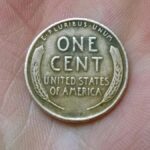The Lincoln Wheat Penny Valued at $60 Million: In the world of rare coins, few stories capture the imagination quite like that of the 1943 copper Lincoln Wheat Penny. While most pennies from this era are worth just a single cent, this particular coin commands an astounding price tag of $60 million, making it the most valuable penny ever discovered. Its journey from a wartime mistake to a numismatic treasure tells a fascinating tale of history, chance, and the enduring appeal of rare coins.
A Penny Born from Wartime Necessity
The story begins during World War II, when the United States faced crucial decisions about resource allocation. Copper, essential for manufacturing ammunition and military equipment, became too valuable to use in everyday currency. In response, the U.S. Mint made a historic decision to produce pennies from zinc-coated steel throughout 1943. However, in a twist of fate that would later create numismatic history, a handful of copper planchets left over from 1942 accidentally made their way into the pressing machines.
The Birth of a Mistake
Among the billions of steel pennies produced in 1943, approximately ten copper versions were mistakenly struck at the Philadelphia Mint. These copper pennies were never meant to exist, making them some of the rarest coins in American history. The mere existence of these coins represents a fascinating intersection of wartime policy, industrial processes, and human error.
From Pocket Change to Priceless Treasure
The journey of the $60 million penny began in 1947 when a young boy in Philadelphia made an extraordinary discovery. Like many children of his era, he was probably checking his change for interesting coins, never imagining he would find something so significant. The penny spent decades in a family drawer, its true value unknown to its owners. It wasn’t until the 1980s that experts authenticated the coin, confirming its status as a genuine 1943 copper penny.
The Path to Record-Breaking Value
The coin’s value has risen dramatically over the years, reflecting both its extreme rarity and the growing sophistication of the coin collecting market. In 2018, the penny made headlines when it sold at auction for an unprecedented $60 million. This sale not only set a new record for a single penny but also highlighted the extraordinary premium that collectors place on historically significant mistakes.
What Makes It So Valuable?
Several factors contribute to this penny’s astronomical value. First and foremost is its extreme rarity – with only about ten examples known to exist, it represents one of the scarcest coins in American numismatics. Additionally, the historical context of its creation during World War II adds significant appeal to collectors and historians alike.
The coin’s exceptional state of preservation also plays a crucial role in its value. After being authenticated and graded by experts, this particular specimen was found to be in remarkable condition, having somehow survived decades of potential wear and damage. In the world of numismatics, condition is often as important as rarity in determining a coin’s value.
A Coin Still in Circulation
Perhaps one of the most intriguing aspects of this valuable penny is that it technically remains legal tender. While it’s extremely unlikely that anyone would ever use it to buy a stick of gum, the fact that this $60 million coin could theoretically be spent for one cent adds an element of whimsy to its story. This detail serves as a reminder of the fascinating disconnect between a coin’s face value and its collector value.
Impact on the Collecting Community
The story of the 1943 copper penny has had a profound effect on coin collecting. It has inspired countless people to examine their loose change more carefully, hoping to discover their own numismatic treasure. The coin serves as a powerful reminder that extraordinary value can sometimes hide in the most ordinary places.
This penny has also influenced how collectors approach the hobby. Many now focus not just on old or rare coins, but specifically on error coins and varieties that might have similar historical significance. The knowledge that a simple mint mistake could be worth millions has added an extra element of excitement to coin collecting.
Preservation and Legacy
Today, the whereabouts of each known 1943 copper penny is carefully tracked by the numismatic community. Some reside in private collections, while others are displayed in museums where they can be viewed by the public. Each specimen represents not just a valuable collectible, but a unique piece of American history that helps tell the story of how the nation adapted during wartime.
The Future of the $60 Million Penny
As time passes, the value of this remarkable coin may continue to increase. Its combination of rarity, historical significance, and the fascinating circumstances of its creation ensures its place as one of the most important coins in American numismatics. While most of us will never own such a valuable piece, its story reminds us that history can sometimes be found in the most unexpected places.
Learning from a Lucky Find
The tale of the $60 million penny teaches us several valuable lessons. It shows how historical context can transform a simple mistake into a priceless artifact. It demonstrates the importance of preserving and protecting potentially valuable items, even when their worth isn’t immediately apparent. Perhaps most importantly, it reminds us that extraordinary discoveries can happen to ordinary people in ordinary circumstances.
The 1943 copper Lincoln Wheat Penny stands as a testament to the enduring fascination with rare coins and the stories they tell. While its monetary value is impressive, its true worth lies in its ability to connect us with a crucial moment in American history, when even the humble penny played a role in the nation’s wartime effort. For collectors and historians alike, it remains a shining example of how a single coin can capture the imagination and tell a story far more valuable than its weight in copper.





